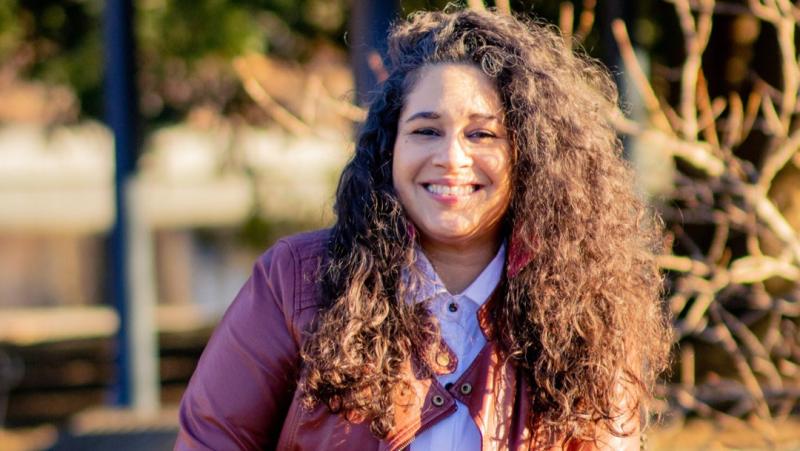Candela: The Radiance and Roots of Peggy Robles-Alvarado’s 'Burn Me Back'
- Sydney Valerio

- Oct 31, 2025
- 4 min read
By Sydney Valerio

Peggy Robles-Alvarado’s Burn Me Back places into our reading gaze a set of poems divided into three parts named "Light," "Slow Burn," and "Glow." Each section offers the reader an opportunity to travel through moments on the page that enlighten our minds, consume our curiosity, and radiate love into our hearts. This poetry collection serves as a time capsule filled with diasporic intimacies that define the shared bonds of the Dominican and Puerto Rican communities—because to be Bori & Domi is potent, and to be from New York City makes it a candela-producing combination.
"Light"
The poems in the first section introduce us to a speaker who makes the experiences of childhood and the formative years visible through a rhythmic narration that entices us to read the poems aloud. After all, how can we let the line in the poem "My Spanglish" that says “trills her rrrrrrrs cuando tiene un pique rastrerrrrrro” not verbally roll off our tongue? From start to finish, each poem in this section holds our hands as it guides us into the journey that shapes the entirety of this book.
We learn about the intricacies of growing up in an environment that placed sleepy children on plastic-covered sofas surrounded by adults who continued partying the night away. In her poem, "At Every Family Party Where the Grown-Ups Drank Too Much," we see the speaker’s blooming power when she says "We knew we inherited these mouths […] Too much lip, too much tongue to keep quiet." They fuel the sparkling, fiery and glowing embers that will light the way for the rest of the book.
"Slow Burn"
The poems in the second section, "Slow Burn," stoke the fire and bring us closer into the red, yellow, orange, white flames that consume our curiosity at a reduced pace.
In "Boca Grande" the speaker confesses:
"Silence has never been in my nature.
Roared in my mother’s belly,
conceived from her desire. I was her wish,
her prayer, her first spoken word.
Born to the sound of thunder."
We lean closer into these lively lines as we learn about the speaker’s relationship with her mother and about the speaker’s sense of womanhood. The speaker’s tías also mothered her. Their wisdom is shared with us in poems like "Tía Rocio’s Advice To Her Nieces About Disclosing Body Counts to Boyfriends." It is a wisdom that levels the worth of a woman’s body in her own terms. The speaker’s concluding lines brand this understanding when she says, "Show him: You have always been better at reading." The power of reading a person as a form of survival is what keeps the flame flickering throughout Robles-Alvarado’s collection.
This notion carries us into the speaker reading her own mother as the section comes to a close. This ability to read her is one that we can see crosses a line that the speaker wants us to know exists. The poem “Why I Shouldn’t Write About Mami” allows us to see the speaker’s taut reverence and vulnerability in her relationship with her mother. This is an area of Robles-Alvarado’s writing that we haven’t seen her place such a bright light on and, when she does, it is a glowing one. We see the tightness in her chest visually displayed in the form of the poem until it ends with a resolving set of loosened lines as she writes, “Asks me who do I think I am […] Reminds me I am daughter first/Storyteller second […] Reminds me/I better not embarrass her.” The poem is a reminder to every nonfiction writer and poet alike that we are storytellers, first.
"Glow"
The concluding section, "Glow," holds a steady radiance of light to what remains urgent for us to consider through this entire book: the power of voice and its telling. In “How I Learned To Build A Fire,” Robles-Alvarado writes: “I learned to burn by accident […] My skin: a eulogy/for what killed you/died in me.” It brings the reader into the fire pit to see the embers that are lit by every memory and written word around spirit and family. Isn’t this what a book written by Peggy Robles-Alvarado always feels like when we are done reading it? We leave the last page reaching for a glass of water and hearing her voice as a steady light shows us what it looks like to lean into what burns.
_____________________
Visit our Bookshop to purchase a copy of Burn Me Back.
_____________________
About the Author:
Peggy Robles-Alvarado is a Jerome Hill Foundation Fellow in Literature, a three-time International Latino Book Award winner, and a BRIO award recipient. She has earned writing fellowships from CantoMundo, Desert Nights, The Frost Place, The Ashbery home School, VONA, Candela Playwrights, Dramatic Question Theater, and NALAC. With two master’s degrees in education and an MFA in performance studies, Peggy’s work appears in The Breakbeat Poets Vol. 4: LatiNext, !Manteca!, great weather for MEDIA, and What Saves Us, as well as online in Poets.org, The Quarry at Split This Rock, The Common, Tribes.org, and NACLA.org. She has been featured at Sofest Latine Theater Festival, The Dodge Poetry Festival, Lincoln Center, HBO Habla Women, The Smithsonian Institute, Pen America, Harvard University, and AWP. Through her 501(c)(3), Robleswrites Production Inc., she created Lalibreta.online and The Abuela Stories Project. Learn more at robleswrites.com
_____________________
Sydney Valerio is an award winning mixed genre writer and educator, a performer, an editor, and an ultra marathoner who’s a New York City Kid Who’s Now a New York City Adult. Learn more about Sydney Valerio at www.sydneyvalerio.com







Thanks for giving this information. What you've put on your blog is great. You published a blog post that was both useful and interesting. Play the free online game redactle